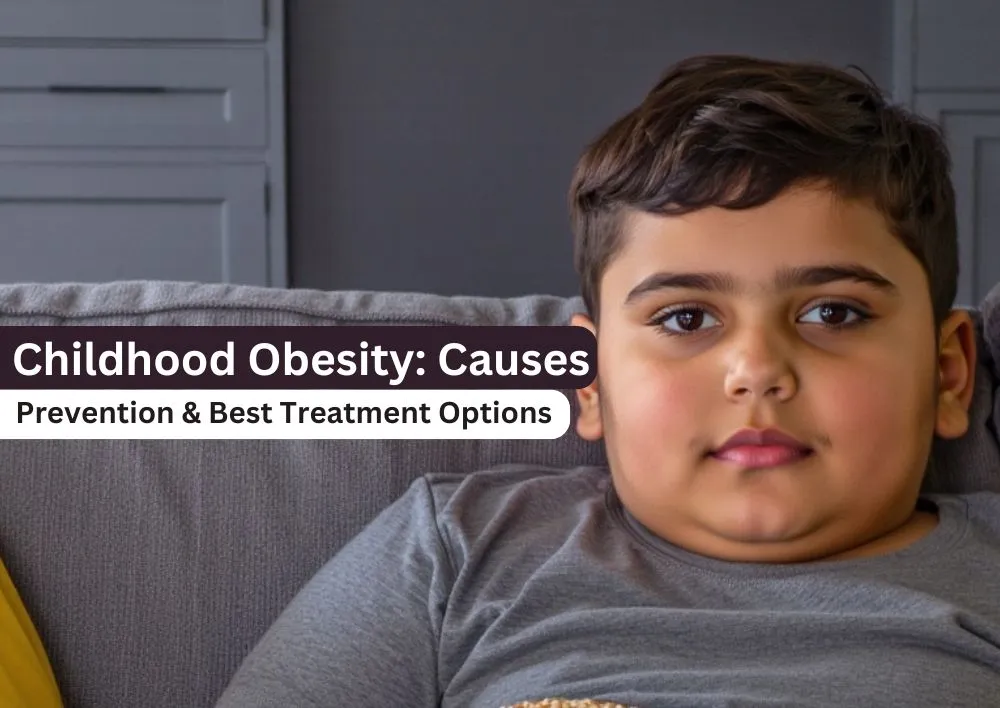Childhood Obesity: Causes, Prevention, and Treatment
Summary: Childhood obesity is a growing global health crisis affecting millions of children and adolescents. It increases the risk of diabetes, heart disease, and psychological issues. Major causes include unhealthy eating habits, lack of physical activity, genetic factors, and socioeconomic conditions. Prevention involves a balanced diet, regular exercise, and reduced screen time. Early intervention and proper treatment, including lifestyle modifications and medical support, can help manage obesity.
Overview
Childhood obesity has become a global health crisis. Studies say that it is affecting millions of children and adolescents worldwide. It is a serious medical condition that can lead to long-term health problems, including diabetes, heart disease, and psychological issues. With changing lifestyles, increased consumption of unhealthy foods, and reduced physical activity, childhood obesity rates are rising at an alarming pace. Addressing this issue requires awareness, prevention, and proper medical interventions. In this blog post, we will explore childhood obesity, including its causes, treatment, impact on adulthood, and prevention strategies.
Childhood Obesity Definition
According to the best pediatrician surgeon in Gurgaon at Miracles Apollo Cradle, childhood obesity is a condition where a child has excessive body fat that negatively impacts their health and well-being. It is measured using the Body Mass Index (BMI), which considers a child's weight about their height. According to the World Health Organization (WHO), a child is classified as overweight if their BMI is above the 85th percentile and obese if it is above the 95th percentile for their age and gender.
Childhood Obesity Reasons
Several factors lead to childhood obesity, including:
-
Poor Diet: Consumption of fast food, sugary drinks, processed snacks, and high-calorie foods increases weight gain. Lack of fruits, vegetables, and fiber-rich foods in the diet.
-
Lack of Physical Activity: Increased screen time leads to a sedentary lifestyle. Reduced outdoor play and less participation in sports.
-
Genetic Factors: Children with obese parents have a higher chance of becoming obese due to genetic predisposition and shared lifestyle habits.
-
Psychological Factors: Stress, depression, and anxiety can lead to emotional eating and unhealthy eating patterns.
-
Lack of Sleep: Insufficient sleep affects metabolism and leads to increased cravings for unhealthy foods.
-
Socioeconomic Factors: Low-income families may have limited access to healthy foods and safe spaces for exercise.
Childhood Obesity Effects on Adulthood
Obese children are more likely to become obese adults, increasing their risk of severe health problems, such as:
-
Increased Risk of Chronic Diseases: Higher chances of developing type 2 diabetes, hypertension, and heart disease.
-
Psychological and Social Effects: Increased likelihood of low self-esteem, depression, and anxiety. Higher risk of bullying and social isolation.
-
Reduced Life Expectancy: Obesity-related complications can lead to a shorter lifespan and decreased quality of life.
Childhood Obesity Treatment
Treatment depends on the severity of obesity and associated health risks.
-
Lifestyle Modifications: Primary treatment focuses on dietary changes, physical activity, and behavior modification.
-
Medical Intervention: In some cases, medications may be prescribed to manage obesity-related complications.
-
Psychological Support: Counseling and therapy help address the emotional and psychological triggers of obesity.
-
Bariatric Surgery: Rarely recommended for children, but in extreme cases of severe obesity with life-threatening conditions, bariatric surgery may be considered.
Childhood Obesity Complications
If left untreated, childhood obesity can lead to severe complications:
1. Physical Health Issues
-
Type 2 diabetes.
-
High blood pressure and cholesterol.
-
Sleep apnea and breathing problems.
-
Joint pain and musculoskeletal disorders.
2. Psychological Complications
-
Depression, anxiety, and eating disorders.
-
Poor academic performance due to low self-confidence.
3. Social Impact
-
Discrimination and bullying
-
Lower career opportunities and financial instability in adulthood
Childhood Obesity Risk Factors
Several risk factors contribute to childhood obesity, including:
-
Family History: Children with obese parents or siblings are at a higher risk.
-
Unhealthy Eating Patterns: High consumption of calorie-dense, nutrient-poor foods.
-
Sedentary Lifestyle: Lack of physical activity and excessive screen time.
-
Socioeconomic Status: Limited access to nutritious food and healthcare.
-
Psychological Factors: Emotional stress and unhealthy coping mechanisms.
Conclusion:
Childhood obesity is a growing health concern that requires immediate attention. By promoting healthy eating habits, physical activity, and lifestyle modifications, parents, schools, and healthcare providers can work together to prevent and manage obesity in children. Early intervention is crucial to reduce the risk of severe health complications in adulthood. If your child is at risk, consult a pediatrician near you at Miracles Healthcare to create a personalized plan for a healthier future.














Was the information useful?
0 0